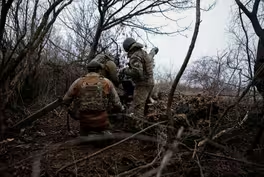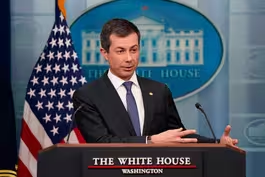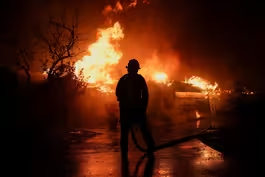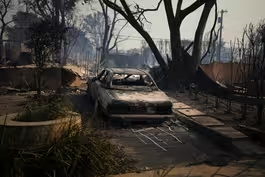
Syria's Alawites face uncertain future after fall of Assad
Clip: 1/8/2025 | 9m 35sVideo has Closed Captions
Syria's once-empowered Alawite minority faces uncertain future after fall of Assad
As Syria emerges from decades of dictatorship, people in the Assad family's ancestral home of Latakia province are both overjoyed and anxious. Assad and his family are Alawite, an offshoot of Shia Islam, and the people of his former region fear the new Sunni-controlled government will target them. Leila Molana-Allen reports from Assad’s hometown, a crumbling vestige of the regime.
Problems playing video? | Closed Captioning Feedback
Problems playing video? | Closed Captioning Feedback
Major corporate funding for the PBS News Hour is provided by BDO, BNSF, Consumer Cellular, American Cruise Lines, and Raymond James. Funding for the PBS NewsHour Weekend is provided by...

Syria's Alawites face uncertain future after fall of Assad
Clip: 1/8/2025 | 9m 35sVideo has Closed Captions
As Syria emerges from decades of dictatorship, people in the Assad family's ancestral home of Latakia province are both overjoyed and anxious. Assad and his family are Alawite, an offshoot of Shia Islam, and the people of his former region fear the new Sunni-controlled government will target them. Leila Molana-Allen reports from Assad’s hometown, a crumbling vestige of the regime.
Problems playing video? | Closed Captioning Feedback
How to Watch PBS News Hour
PBS News Hour is available to stream on pbs.org and the free PBS App, available on iPhone, Apple TV, Android TV, Android smartphones, Amazon Fire TV, Amazon Fire Tablet, Roku, Samsung Smart TV, and Vizio.
Providing Support for PBS.org
Learn Moreabout PBS online sponsorshipAMNA NAWAZ: As Syria emerges from decades of dictatorship, Syrians in the Assad family's ancestral home of Latakia province are both overjoyed and anxious.
Assad and his family are Alawite, an offshoot of Shia Islam, and the people of his former region fear the new Sunni-controlled government will target them, both for their religious affiliation, as well as the region's historic support for the regime.
Leila Molana-Allen reports now from Qardaha, the Assads' hometown in Latakia and now a crumbling vestige of the regime.
LEILA MOLANA-ALLEN: Empty shoes and fallen pedestals, as Syria reels and rebuilds from the rapid fall of the family who ruled this country with an iron fist for half-a-century.
In Latakia, the homeland of the Assad's Alawi sect, the enormous statue of former President Hafez al-Assad that sternly watched over this central junction for decades has been cut off at the ankles.
Children shriek in delight at the heady, unfamiliar feeling of freedom on the streets, while their cautious elders wait nervously for what comes next.
As Bashar al-Assad's tightly controlled empire unravels, we're visiting the very heart of it, Qardaha, the Assads' family village.
Thrown open, the heavy iron gates of the family home.
Like their properties across the country, there are signs it was hastily abandoned, but the house isn't empty.
This is the once palatial garden of the house where Bashar al-Assad was born, and now people have realized he's not coming back, but they're making use of what the house has to give in terms of firewood.
A bitter winter is already under way.
In every room, locals have come to strip away whatever can be burned, the window frames, shutters, kitchen cupboards ripped to pieces and piled into a waiting taxi.
A young boy watches as his father and uncle hack branches off the leafy trees in the ruins of the garden.
This place has the air of martial law about it.
neighbors watch on curiously from the street as the now useless web of security cameras sits idle.
Down the road, the once illustrious tomb of Bashar's father is now a symbol of the rebel advance.
As they took Latakia, cheering rebel fighters set the tomb ablaze, graffitiing the names of their brigades across the walls and by the entrance a message damning Hafez al-Assad (SPEAKING IN FOREIGN LANGUAGE) to the trash pile of history.
A stronghold of a regime that once seemed undefeatable lies in ruins, but the legacy of their decades of misrule marks every aspect of daily life here.
As we drive along the coastal highway, the hollow boom of airstrikes.
The Israeli army is taking the opportunity to take out Syria's naval bases and coastal ports while no one's really in charge.
But while the world plays politics, residents here are more concerned with making it through the winter.
Samar Ahmed watched for years as a select few close to the Assads reveled in wealth and status, while the rest of her sect starved.
SAMAR AHMED, Alawite Latakia Resident (through translator): We hit rock bottom and no one cared about us or our needs.
Whenever we asked for help, the regime blamed U.S. sanctions.
But how did sanctions work?
Did they choose favorites?
Because we saw luxurious cars and people were living their lives to the fullest, while others were living the lowest of the low.
LEILA MOLANA-ALLEN: Samar believed in the revolution in the early days.
She wanted a free Syria for all.
After she criticized the regime for failing to provide bread and decent salaries, the authorities arrived at her door and quickly made her choice clear.
SAMAR AHMED (through translator): Everything we said was taken against us more than any other sect.
It was forbidden for us to say our opinion or criticize or even claim any of our rights.
And if we do so, we might just disappear one day.
LEILA MOLANA-ALLEN: Wrapped in a winter coat as she shivers in her unheated department, Samar spits the Assad name through gritted teeth.
SAMAR AHMED (through translator): This is what we never dared to say out loud.
They're a mafia.
Why did he sacrifice the lives of all those innocent people for 14 years?
He couldn't even protect himself and betrayed us all.
How was he going to protect us?
LEILA MOLANA-ALLEN: For decades, Alawites here formed the backbone of the Assads' military and political control.
This minority of around 2.5 million Syrians filled two-thirds of the army's senior ranks after Hafez al-Assad seized power in 1971.
As the civil war spiraled, his son Bashar increasingly dictated their support with threats, rather than enticements: Back me, or the country's Sunni Muslims, all of whom the regime labeled terrorists, will slaughter you.
As a result, many thought Alawites were protected and enriched by the regime.
The residential backstreets here tell a different story, one of entrenched poverty, neglect and control through fear.
Samar hopes the new government will be good for everyone, but even within her own family, they disagree.
Many young Alawite men here tried to flee forced conscription.
But Samar's son Ahmed fought for years as a first lieutenant in the Eastern Syrian desert of Deir ez-Zor against militants from ISIS, al-Qaida and Jabhat al-Nusra, the precursor group to Hay'at Tahrir al-Sham.
Some of those same fighters will now be leading the new government.
He fears retribution.
AHMED NIZAR ALI, Alawite Latakia Resident (through translator): It's a terrorist organization.
Now they're called HTS.
And they just changed into civilian clothes.
We're afraid of their ideology.
Are they extremists?
We have started to fear these people didn't come just to destroy the Assad regime, but also to destroy us.
LEILA MOLANA-ALLEN: Twenty-seven-year-old Ahmed has spent half his life hiding his views to protect his family, as he watched other young men imprisoned, tortured and killed around him.
Now he fears new oppressors under a different name.
AHMED NIZAR ALI (through translator): We learned to be silent.
We're not used to talking about politics.
Even when we saw things that were wrong, we kept quiet.
We don't want to be under another dictator's rule or another terrorist organization.
LEILA MOLANA-ALLEN: I ask him what he thinks about HTS' guarantees that army conscripts will have full amnesty as they build a state with rights for all Syrians.
He's not convinced.
AHMED NIZAR ALI (through translator): We're afraid of what might happen in the future.
Now all the cameras are focused on Syria, but it will be forgotten in a few months.
We need international supervision to make sure.
LEILA MOLANA-ALLEN: Ahmed's fears have proved justified.
Attacks in Latakia and surrounding villages have left dozens dead and injured and neighborhoods in pieces.
The memory of years of atrocities runs deep here.
With Bashar and his family safe in Moscow, those seen as aiding his reign are bearing the brunt.
This area is an example of Syria's pluralism.
This road links Alawite and Sunni neighborhoods living side by side, more crumbling walls and bitter cold in these damp shacks, the legacy of decades of living without.
Madiha hasn't seen her four children in a decade.
They stole across the border to Turkey early on in the civil war for safety and to try to find work.
MADIHA AL SALEH, Sunni Latakia Resident (through translator): I suffered a lot after they left.
My husband is sick and there's no one to help him or get medications.
Our life was tragic.
Even now, there's so much poverty.
LEILA MOLANA-ALLEN: Hisham and Madiha have carried the legacy of the Assads' cruelty their entire lives.
As a young lieutenant in the army in the 80s, Hisham was accused of being a member of the Muslim Brotherhood, they believe, because he's Sunni,arrested and brutally tortured in Hafez's dungeons.
The harassment didn't stop under Bashar, but now their abusers wore different uniforms.
MADIHA AL SALEH (through translator): The Russian army was walking in the streets terrifying everyone.
People were hiding their children from them.
No one dared to go out.
They invaded our house several times at 3:00 a.m.
They stole everything and turned the house upside down.
They took my husband and put a gun to his chest.
LEILA MOLANA-ALLEN: Hisham and Madiha miss their kids terribly, but they're glad they left.
They couldn't bear for them to endure what they have in these difficult years.
MADIHA AL SALEH (through translator): My kids want to come back now, but they can't afford to.
Whenever they can, they send us money.
Working in Turkey is hard and they barely have enough for themselves.
LEILA MOLANA-ALLEN: There's hope for the first time in decades, but in the face of so much hardship, the harsh reality is, it could take years for daily life here to improve.
As we leave, a crowd of children runs into our path, a fierce game of soccer under way with their latest prize, the toppled statue's gold-plated head now rolling in the dirt, a lowly end for the family that reduced their country to dust and despair.
For the "PBS News Hour," I'm Leila Molana-Allen in Latakia, Syria.
Biden announces final Ukraine aid before Trump takes office
Video has Closed Captions
Clip: 1/8/2025 | 4m 56s | Biden administration announces its final aid package to Ukraine before Trump takes office (4m 56s)
Buttigieg recaps transportation infrastructure improvements
Video has Closed Captions
Clip: 1/8/2025 | 9m 46s | Buttigieg recaps administration's efforts to improve transportation infrastructure (9m 46s)
Is U.S. foreign aid for health care being used effectively?
Video has Closed Captions
Clip: 1/8/2025 | 9m 29s | Is U.S. foreign aid for health care being used effectively? (9m 29s)
LA Crews struggle to stop fires fueled by historic winds
Video has Closed Captions
Clip: 1/8/2025 | 4m 37s | 'This is as bad as I've ever seen': Crews struggle to stop fires fueled by historic winds (4m 37s)
Wildfires rage across LA, leaving neighborhoods in ruins
Video has Closed Captions
Clip: 1/8/2025 | 7m 58s | Massive wildfires continue to rage across LA area, leaving neighborhoods in ruins (7m 58s)
Providing Support for PBS.org
Learn Moreabout PBS online sponsorship
- News and Public Affairs

FRONTLINE is investigative journalism that questions, explains and changes our world.

- News and Public Affairs

Amanpour and Company features conversations with leaders and decision makers.












Support for PBS provided by:
Major corporate funding for the PBS News Hour is provided by BDO, BNSF, Consumer Cellular, American Cruise Lines, and Raymond James. Funding for the PBS NewsHour Weekend is provided by...




